Are you curious about the lives of those who once resided in the floating villages of Southeast Asia? While some floating villages have transformed into tourist hotspots with questionable ethics, it’s still possible to respectfully witness and understand the unique culture of these communities through ethical tourism. SIXT.VN is dedicated to providing authentic and enriching travel experiences in Vietnam, ensuring your visit is both memorable and responsible. Discover cultural immersion, local interactions, and community support with our tailored travel solutions.
1. What Happened to the Floating Villages?
Many floating villages, once vibrant communities centered around fishing and river life, have undergone significant changes due to tourism and economic pressures. In some cases, residents have been relocated, and the villages have been repurposed as tourist attractions. It is essential to be aware of these changes to ensure that your visit is respectful and beneficial to the local community. According to a report by the Vietnam National Administration of Tourism in 2023, sustainable tourism practices are crucial for preserving cultural heritage sites.
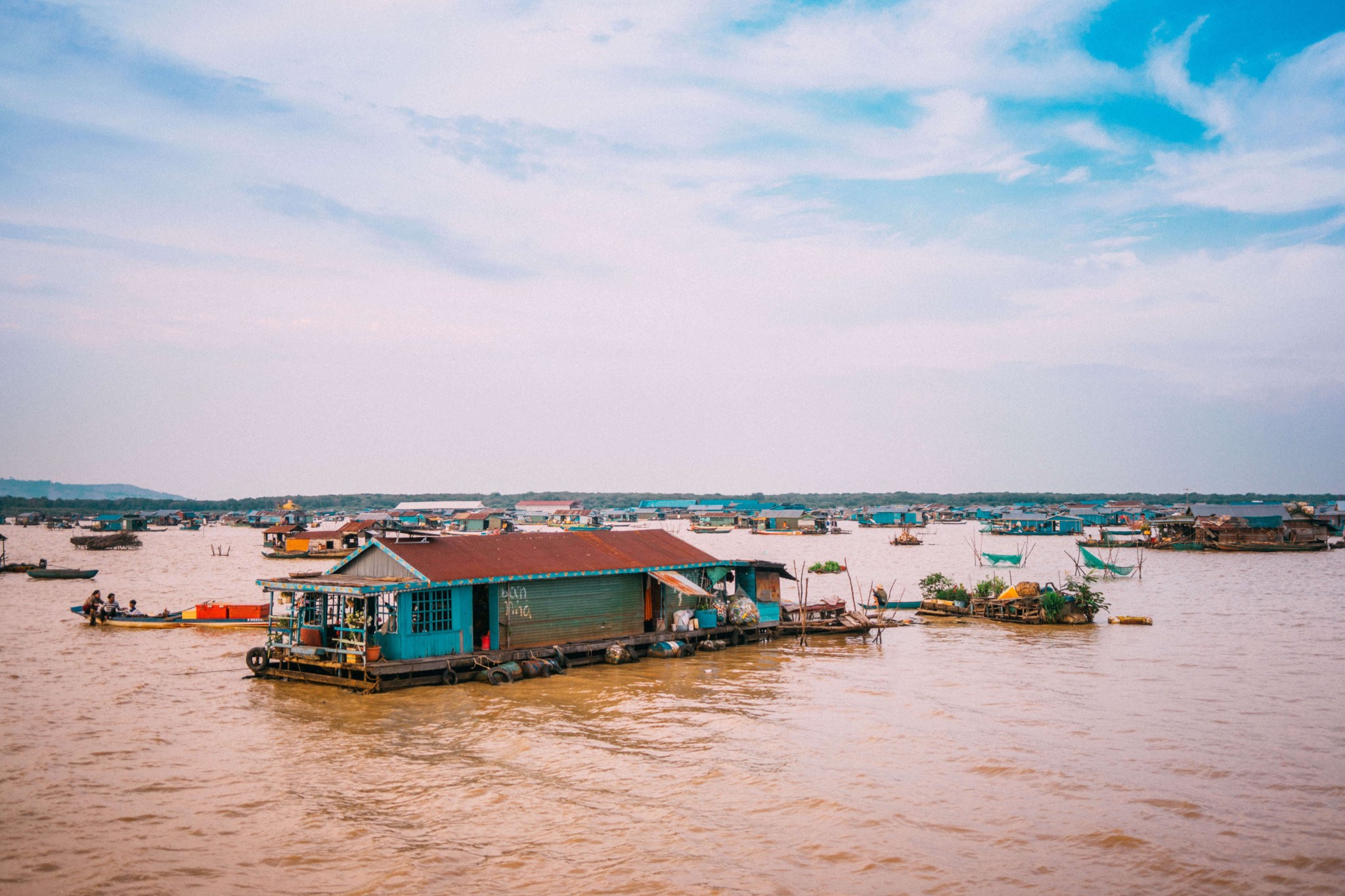 Traditional houseboats create floating villages on Tonle Sap Lake, reflecting the unique way of life of the local communities
Traditional houseboats create floating villages on Tonle Sap Lake, reflecting the unique way of life of the local communities
2. Can You Still See Authentic Floating Villages?
Yes, it is still possible to see authentic floating villages, but it requires careful planning and research. Some villages have managed to maintain their traditional way of life while embracing sustainable tourism practices. To find these authentic experiences, look for locally-owned tour operators that prioritize community benefits and cultural preservation. These operators often work directly with the villagers to ensure that tourism revenue supports their livelihoods and preserves their traditions. According to a study by TripAdvisor in 2022, travelers increasingly prefer authentic experiences that contribute positively to local communities.
3. What Are the Challenges of Visiting Floating Villages?
Visiting floating villages comes with several challenges, including:
3.1. Ethical Concerns
Some tours exploit the residents by not providing them with adequate financial benefits or respecting their privacy. It’s crucial to choose tours that prioritize the well-being and dignity of the villagers.
3.2. Environmental Impact
Increased tourism can lead to pollution and damage to the fragile aquatic ecosystems. Sustainable tourism practices are essential to minimize the environmental footprint.
3.3. Authenticity
Many floating villages have become commercialized, offering staged experiences that don’t reflect the true way of life of the residents. Researching and selecting authentic tours is crucial.
4. How Can You Ensure an Ethical Visit?
To ensure an ethical and responsible visit to a floating village, consider the following:
4.1. Choose Locally-Owned Tours
Opt for tours operated by local residents or companies that directly benefit the community. This ensures that your money supports the villagers and their livelihoods.
4.2. Respect Local Customs
Be mindful of the local customs and traditions. Dress modestly, ask for permission before taking photos, and avoid intrusive behavior.
4.3. Support Local Businesses
Purchase goods and services from local vendors to contribute to the local economy. Avoid buying souvenirs that may harm the environment or exploit local resources.
4.4. Educate Yourself
Learn about the history, culture, and challenges faced by the floating village community. This will help you appreciate their way of life and contribute to meaningful interactions.
5. What Can You Learn About the Life of Former Floating Village Residents?
Even if some villages have changed, there are still ways to learn about the traditional lifestyle of former floating village residents:
5.1. Cultural Centers
Visit cultural centers or museums that showcase the history and traditions of floating village communities. These centers often offer exhibits, workshops, and demonstrations that provide insights into their unique way of life.
5.2. Oral Histories
Seek out opportunities to listen to oral histories from former residents. These personal accounts can provide valuable insights into the challenges and triumphs of living on the water.
5.3. Community Initiatives
Support community initiatives that preserve and promote the cultural heritage of floating villages. These initiatives may include traditional crafts workshops, cultural performances, and educational programs.
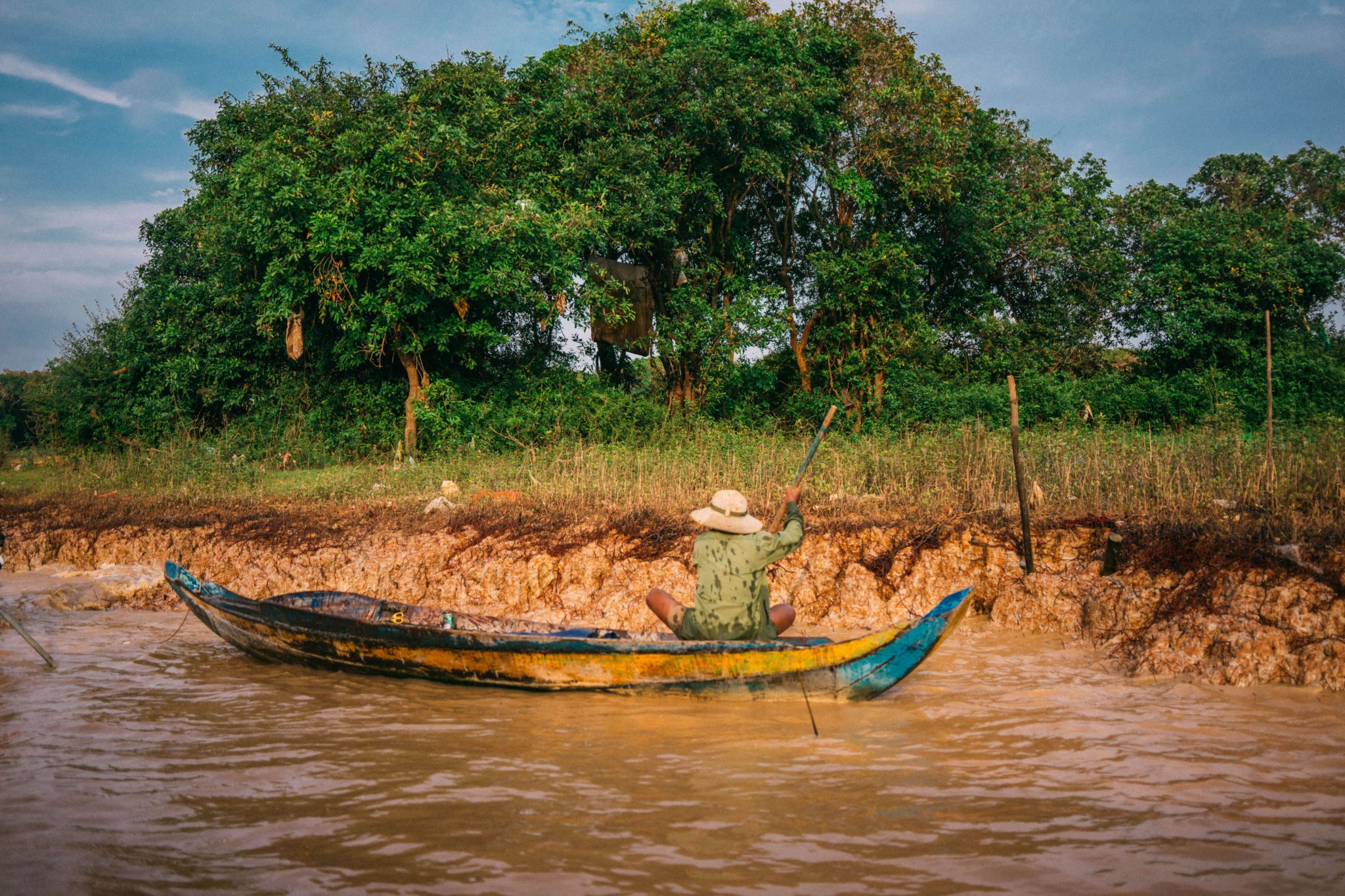 Cambodian man on his small boat, engaging in traditional fishing practices on Tonle Sap Lake
Cambodian man on his small boat, engaging in traditional fishing practices on Tonle Sap Lake
6. What Are the Best Floating Villages to Visit in Vietnam?
Vietnam offers several captivating floating villages that provide unique cultural experiences. Here’s a table highlighting some of the best options:
| Floating Village | Location | Key Features | Ethical Considerations |
|---|---|---|---|
| Cua Van Floating Village | Halong Bay | Traditional fishing village, stunning natural scenery, opportunities for kayaking and swimming. | Choose eco-friendly tours that support local conservation efforts and respect the community’s way of life. |
| Cai Rang Floating Market | Mekong Delta | Bustling market with vendors selling fresh produce, local delicacies, and handicrafts from their boats. | Opt for tours that directly benefit the local vendors and promote sustainable agricultural practices. |
| Ba Be Lake Floating Homes | Ba Be National Park | Unique floating homes on a serene lake, surrounded by lush forests and limestone mountains. | Select tours that prioritize environmental protection and support the local Tay ethnic community. |
| Halong Floating Village | Halong Bay | Traditional fishing village, stunning natural scenery, opportunities for kayaking and swimming. | Choose eco-friendly tours that support local conservation efforts and respect the community’s way of life. |
7. What Are the Benefits of Using SIXT.VN for Your Trip to Vietnam?
SIXT.VN offers a range of services designed to make your trip to Vietnam seamless and enriching:
7.1. Tailored Travel Itineraries
We create personalized itineraries that cater to your interests and preferences, ensuring you experience the best of Vietnam’s culture and natural beauty.
7.2. Airport Transfer Services
Enjoy hassle-free airport transfers with our reliable and comfortable transportation options.
7.3. Hotel Booking Assistance
We help you find the perfect accommodation to suit your budget and preferences, from boutique hotels to luxury resorts.
7.4. Tour and Excursion Bookings
We offer a curated selection of tours and excursions that showcase Vietnam’s cultural heritage and natural wonders.
7.5. 24/7 Customer Support
Our dedicated customer support team is available 24/7 to assist you with any queries or concerns.
8. What Can You Expect from a Tour of Cua Van Floating Village with SIXT.VN?
A tour of Cua Van Floating Village with SIXT.VN offers an immersive cultural experience:
8.1. Traditional Fishing Village Visit
Explore the traditional fishing village and learn about the daily lives of the residents.
8.2. Kayaking and Swimming
Enjoy kayaking through the serene waters and swimming in the pristine bays.
8.3. Cultural Immersion
Interact with the local community and learn about their customs, traditions, and fishing techniques.
8.4. Sustainable Tourism Practices
We prioritize sustainable tourism practices that minimize environmental impact and support the local community.
9. What Should You Pack for a Visit to a Floating Village?
Packing the right items can enhance your experience and ensure you’re prepared for the unique conditions of a floating village:
9.1. Lightweight Clothing
Choose lightweight, breathable clothing suitable for warm and humid weather.
9.2. Sun Protection
Pack sunscreen, a hat, and sunglasses to protect yourself from the sun.
9.3. Insect Repellent
Mosquitoes and other insects can be prevalent, so bring insect repellent.
9.4. Comfortable Shoes
Wear comfortable walking shoes or sandals suitable for navigating uneven surfaces.
9.5. Rain Gear
Be prepared for occasional rain showers with a raincoat or umbrella.
9.6. Camera
Capture the stunning scenery and cultural moments with a camera or smartphone.
10. How Can You Support the Local Community During Your Visit?
Supporting the local community is essential for ensuring that tourism benefits the residents and preserves their way of life:
10.1. Purchase Local Products
Buy handicrafts, souvenirs, and other products from local vendors to support their livelihoods.
10.2. Dine at Local Restaurants
Enjoy traditional Vietnamese cuisine at local restaurants to experience the flavors of the region and support local businesses.
10.3. Participate in Community Activities
Engage in community activities, such as traditional crafts workshops or cultural performances, to learn about local traditions and support cultural preservation.
10.4. Donate to Local Charities
Consider donating to local charities or organizations that support the well-being and development of the floating village community.
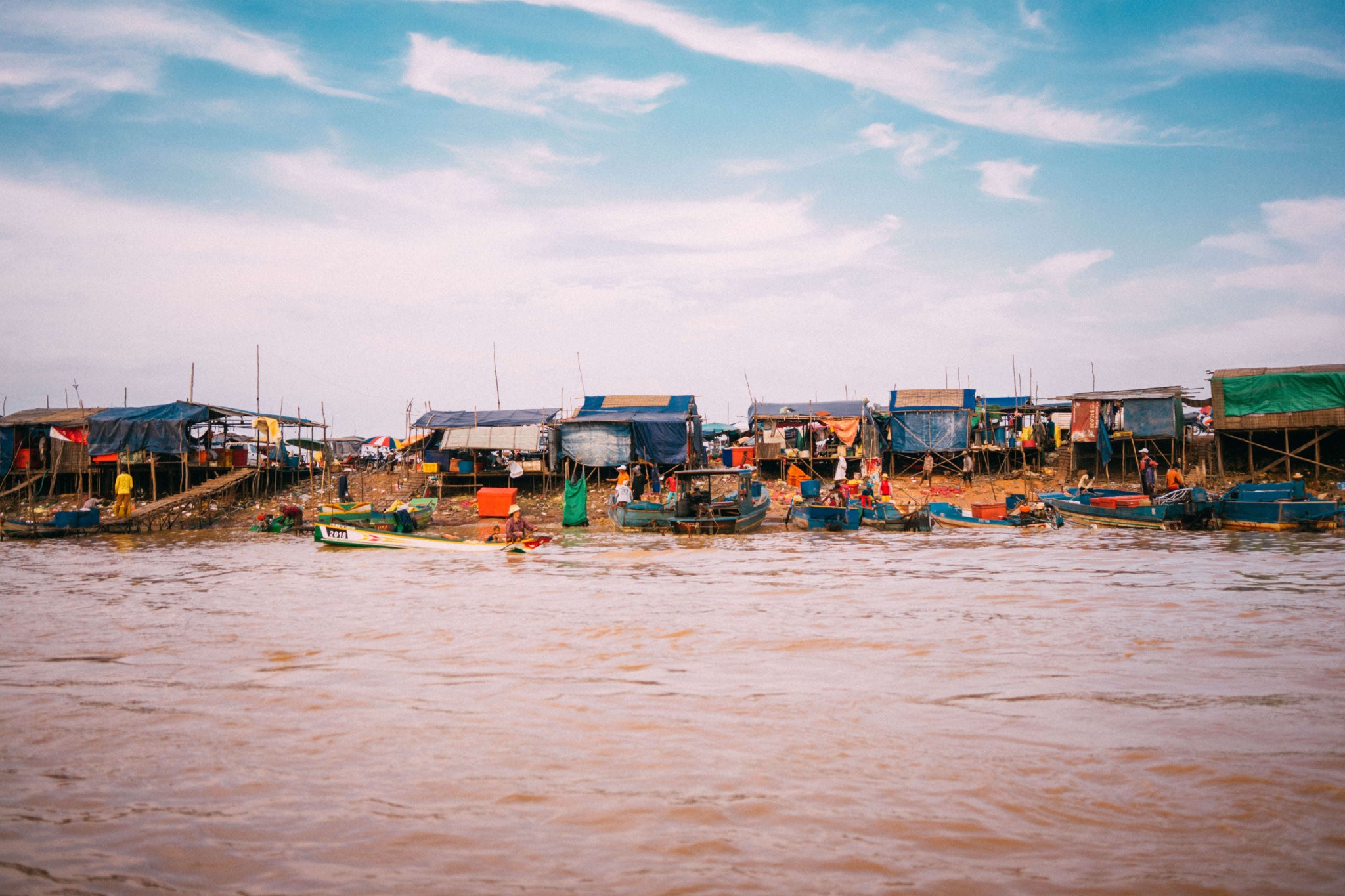 Floating houses create a unique architectural landscape on Tonle Sap Lake, showcasing the ingenuity of the residents
Floating houses create a unique architectural landscape on Tonle Sap Lake, showcasing the ingenuity of the residents
11. What Is the History of Floating Villages in Southeast Asia?
Floating villages have a rich history rooted in the unique environmental conditions and cultural adaptations of Southeast Asia. These villages emerged as communities adapted to living on water, often due to seasonal flooding or limited access to land. Over time, they developed unique social structures, economic activities, and cultural traditions centered around fishing, trade, and river life. According to historical records from the Institute of Southeast Asian Studies, the earliest floating settlements can be traced back to the Mekong Delta region.
12. What Are the Unique Cultural Traditions of Floating Villages?
Floating villages boast a wealth of unique cultural traditions that reflect their close relationship with the water:
12.1. Fishing Techniques
Traditional fishing techniques passed down through generations, including specialized nets, traps, and boats designed for navigating the waterways.
12.2. Boat Building
Skilled boat builders crafting traditional wooden boats that serve as homes, transportation, and workplaces.
12.3. Water-Based Festivals
Vibrant water-based festivals and ceremonies that celebrate the river, honor local deities, and mark important life events.
12.4. Floating Markets
Bustling floating markets where vendors sell fresh produce, local delicacies, and handicrafts from their boats.
13. How Do Floating Villages Adapt to Environmental Challenges?
Floating villages have developed ingenious ways to adapt to the environmental challenges of living on water:
13.1. Floating Homes
Homes built on rafts or platforms that rise and fall with the water level, providing protection from flooding.
13.2. Water Management Systems
Sophisticated water management systems for collecting rainwater, storing water, and managing waste.
13.3. Sustainable Fishing Practices
Sustainable fishing practices that ensure the long-term health of the aquatic ecosystem and the availability of fish stocks.
13.4. Community Cooperation
Strong community cooperation and mutual support networks for coping with natural disasters and other challenges.
14. What Are the Economic Activities of Floating Villages?
Economic activities in floating villages are closely tied to the water and its resources:
14.1. Fishing
Fishing is the primary source of income for many floating village residents, providing food and livelihoods.
14.2. Aquaculture
Aquaculture, or fish farming, is a growing industry in floating villages, providing a sustainable source of income.
14.3. Tourism
Tourism is an increasingly important source of income for floating villages, providing opportunities for locals to offer tours, sell handicrafts, and provide accommodation.
14.4. Trade
Trade and commerce are vital activities in floating villages, with vendors selling goods and services from their boats.
15. What Are the Social Structures of Floating Villages?
Social structures in floating villages are often based on close-knit communities and traditional hierarchies:
15.1. Family Units
Strong family units are the foundation of floating village society, providing support, education, and传承 of traditions.
15.2. Community Leaders
Community leaders play a vital role in resolving disputes, organizing community activities, and representing the interests of the villagers.
15.3. Religious Institutions
Religious institutions, such as temples and pagodas, serve as important centers for spiritual life and community gatherings.
15.4. Social Networks
Extensive social networks connect villagers and facilitate cooperation, mutual support, and the sharing of resources.
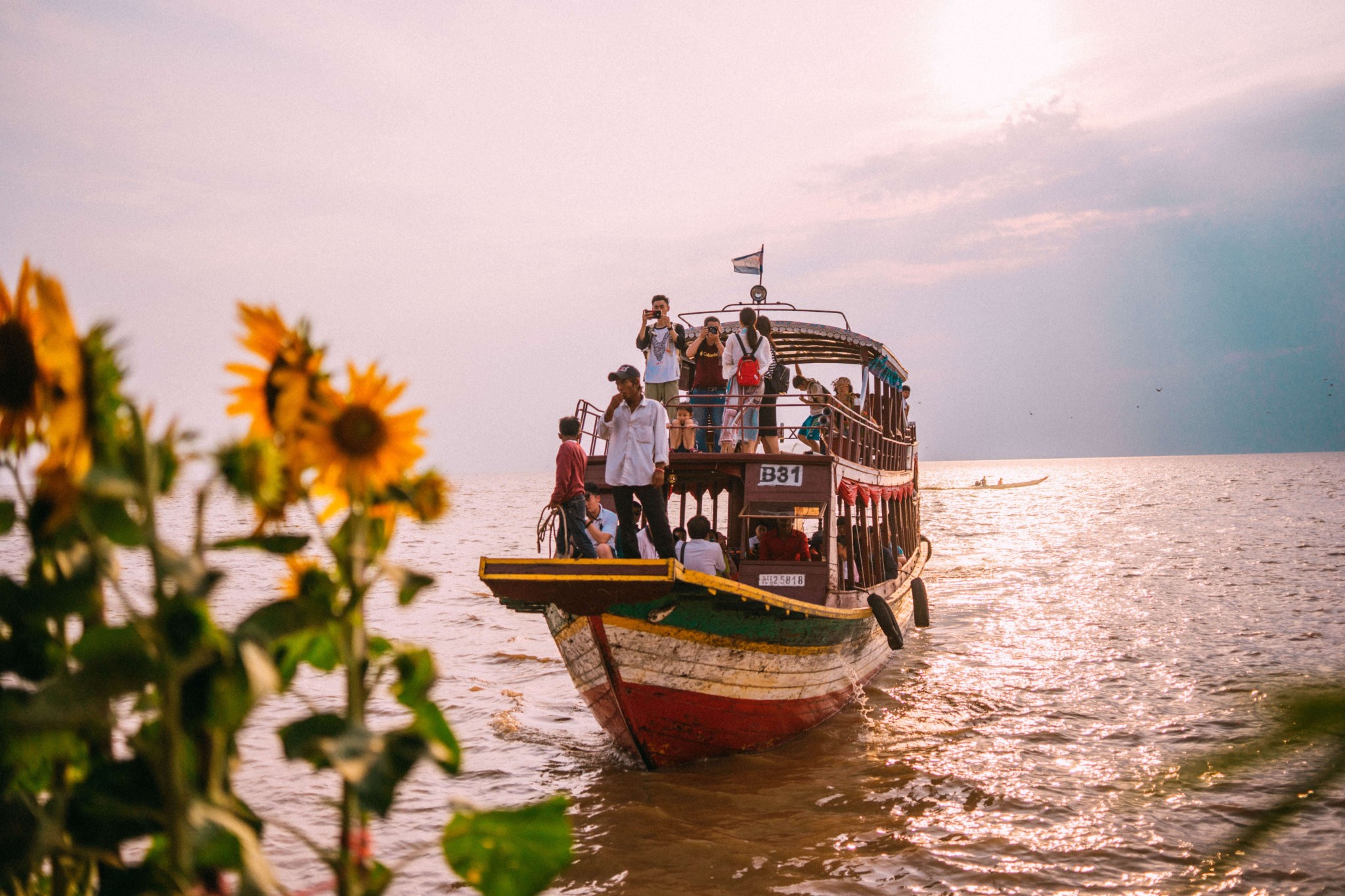 The "floating market" in Chong Khneas is actually a souvenir shop with a crocodile farm, not a traditional local market
The "floating market" in Chong Khneas is actually a souvenir shop with a crocodile farm, not a traditional local market
16. What Are the Environmental Challenges Facing Floating Villages Today?
Floating villages face numerous environmental challenges that threaten their sustainability and way of life:
16.1. Pollution
Pollution from sewage, industrial waste, and agricultural runoff contaminates the waterways and harms aquatic life.
16.2. Climate Change
Climate change is leading to rising sea levels, increased flooding, and more frequent extreme weather events, threatening the stability of floating villages.
16.3. Overfishing
Overfishing is depleting fish stocks and disrupting the delicate balance of the aquatic ecosystem.
16.4. Deforestation
Deforestation in upstream areas is causing soil erosion, increased sedimentation, and reduced water quality in the waterways.
17. What Are the Conservation Efforts to Protect Floating Villages?
Various conservation efforts are underway to protect floating villages and their unique cultural heritage:
17.1. Sustainable Tourism Initiatives
Sustainable tourism initiatives promote responsible travel practices that minimize environmental impact and support local communities.
17.2. Environmental Education Programs
Environmental education programs raise awareness about the importance of protecting the aquatic environment and promoting sustainable practices.
17.3. Community-Based Conservation Projects
Community-based conservation projects empower local residents to manage their resources sustainably and protect their cultural heritage.
17.4. Government Regulations
Government regulations and policies are aimed at reducing pollution, regulating fishing practices, and protecting the environment.
18. What Are the Future Prospects for Floating Villages?
The future prospects for floating villages depend on addressing the environmental challenges they face and promoting sustainable development:
18.1. Sustainable Tourism
Sustainable tourism can provide economic opportunities for floating village residents while preserving their cultural heritage and protecting the environment.
18.2. Diversification of Economic Activities
Diversifying economic activities beyond fishing and tourism can provide a more stable and resilient economy for floating villages.
18.3. Community Empowerment
Empowering local communities to manage their resources sustainably and participate in decision-making processes is essential for the long-term survival of floating villages.
18.4. Government Support
Government support in the form of infrastructure development, education, and healthcare can improve the quality of life for floating village residents.
19. What Are Some Common Misconceptions About Floating Villages?
There are several common misconceptions about floating villages that need to be addressed:
19.1. Poverty
Floating villages are often portrayed as impoverished communities, but many residents have successful businesses and enjoy a good quality of life.
19.2. Lack of Education
Floating villages often have schools and educational opportunities for children, although access to higher education may be limited.
19.3. Unhygienic Conditions
Floating villages have developed systems for managing waste and maintaining hygiene, although challenges remain.
19.4. Lack of Culture
Floating villages have rich cultural traditions and unique ways of life that deserve to be celebrated and preserved.
20. How Can You Help Preserve the Culture of Floating Villages?
You can play a vital role in preserving the culture of floating villages by:
20.1. Visiting Responsibly
Choose ethical and sustainable tour operators that prioritize the well-being of the local community and the environment.
20.2. Supporting Local Businesses
Purchase goods and services from local vendors and artisans to support their livelihoods.
20.3. Spreading Awareness
Share your experiences and knowledge about floating villages with others to raise awareness about their unique culture and challenges.
20.4. Donating to Conservation Organizations
Support conservation organizations that are working to protect floating villages and their cultural heritage.
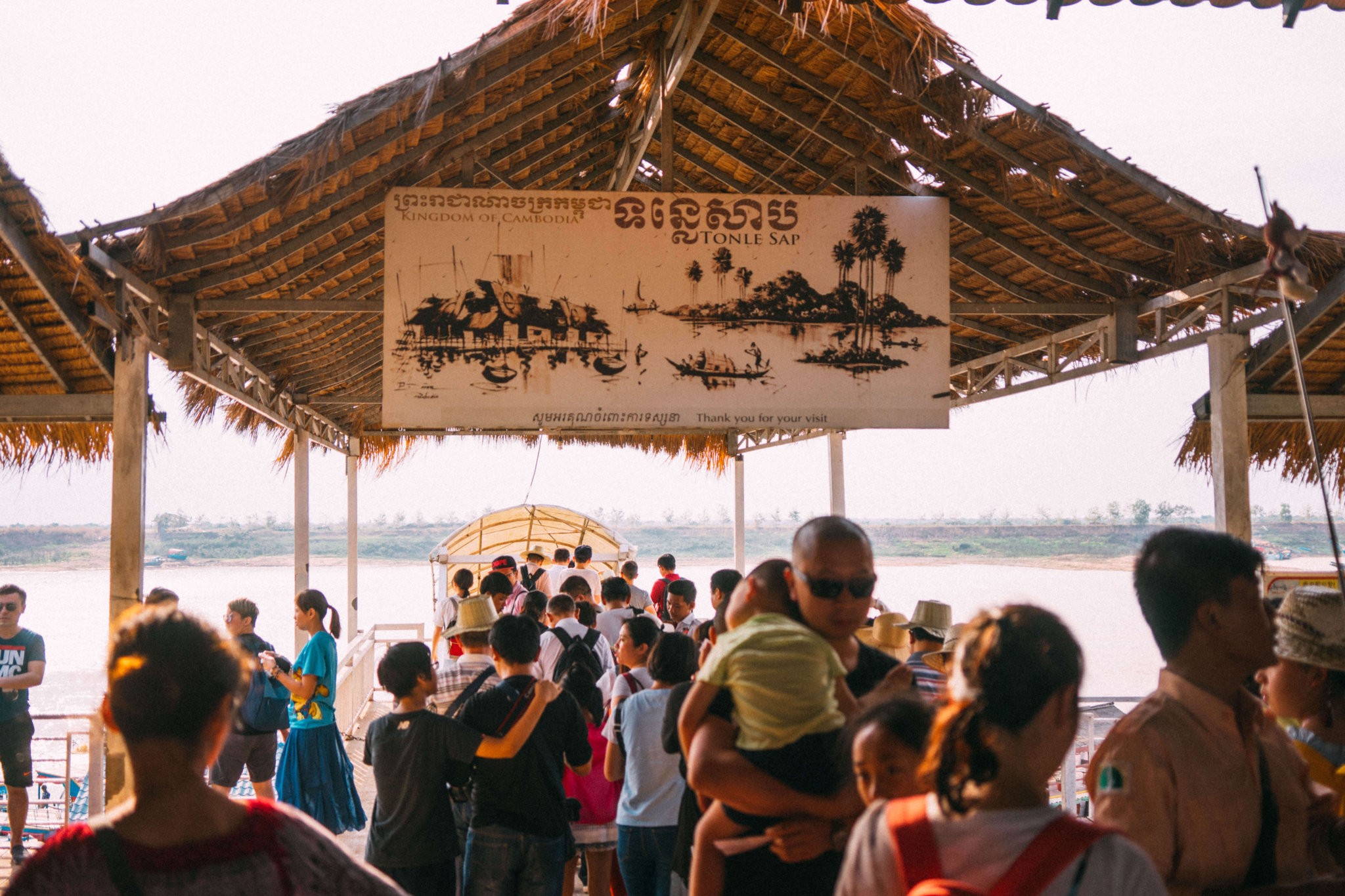 The port parking lot upon arrival is often a sign that the floating village visit is a tourist trap
The port parking lot upon arrival is often a sign that the floating village visit is a tourist trap
21. What Are Some Alternatives to Visiting Over-Commercialized Floating Villages?
If you’re concerned about the ethical implications of visiting over-commercialized floating villages, consider these alternatives:
21.1. Visit Less-Known Villages
Explore less-known floating villages that have not yet been heavily impacted by tourism.
21.2. Stay with Local Families
Arrange homestays with local families to experience their way of life firsthand.
21.3. Volunteer with Community Projects
Volunteer with community projects that support sustainable development and cultural preservation in floating villages.
21.4. Focus on Cultural Immersion
Focus on cultural immersion experiences that prioritize meaningful interactions with local residents.
22. How Can SIXT.VN Help You Plan a Responsible Trip to a Floating Village?
SIXT.VN is committed to providing responsible and sustainable travel experiences that benefit local communities and preserve cultural heritage. We can help you plan a trip to a floating village that:
22.1. Supports Local Communities
We partner with locally-owned tour operators and businesses that prioritize the well-being of the community.
22.2. Minimizes Environmental Impact
We promote sustainable travel practices that minimize environmental impact and protect the aquatic ecosystem.
22.3. Provides Authentic Cultural Experiences
We offer cultural immersion experiences that provide meaningful interactions with local residents and insights into their way of life.
22.4. Offers Customized Itineraries
We create customized itineraries that cater to your interests and preferences, ensuring you have a memorable and enriching experience.
23. What Are the Key Takeaways for Travelers Interested in Floating Villages?
For travelers interested in exploring floating villages, here are the key takeaways:
23.1. Research and Choose Wisely
Research and choose your tour operator carefully, prioritizing ethical and sustainable practices.
23.2. Respect Local Culture
Be respectful of local customs, traditions, and privacy.
23.3. Support Local Businesses
Support local businesses and artisans by purchasing their products and services.
23.4. Be Aware of Environmental Issues
Be aware of the environmental challenges facing floating villages and take steps to minimize your impact.
24. What Questions Should You Ask a Tour Operator Before Booking a Trip to a Floating Village?
Before booking a trip to a floating village, ask the tour operator these important questions:
24.1. How Much of the Tour Price Goes to the Local Community?
Inquire about the percentage of the tour price that directly benefits the local community.
24.2. What Sustainable Practices Do You Follow?
Ask about the sustainable practices they follow to minimize environmental impact.
24.3. How Do You Ensure Respect for Local Culture and Privacy?
Inquire about how they ensure respect for local culture and privacy during the tour.
24.4. Do You Offer Opportunities to Interact with Local Residents?
Ask if they offer opportunities for meaningful interactions with local residents.
25. What Are the Top Tips for Interacting with Local Residents in a Floating Village?
When interacting with local residents in a floating village, keep these tips in mind:
25.1. Be Respectful and Polite
Treat local residents with respect and politeness.
25.2. Ask Permission Before Taking Photos
Always ask permission before taking photos of people or their homes.
25.3. Show Genuine Interest in Their Culture
Show genuine interest in their culture and way of life.
25.4. Learn a Few Basic Phrases in Their Language
Learn a few basic phrases in their language to show respect and make communication easier.
26. How Can You Avoid Contributing to Tourist Traps in Floating Villages?
To avoid contributing to tourist traps in floating villages:
26.1. Research Tour Operators Thoroughly
Research tour operators thoroughly and choose those with a good reputation for ethical practices.
26.2. Avoid Tours That Focus on Exploitation
Avoid tours that focus on exploiting the local community or the environment.
26.3. Be Wary of High-Pressure Sales Tactics
Be wary of high-pressure sales tactics and avoid purchasing overpriced souvenirs.
26.4. Support Local Initiatives Directly
Support local initiatives directly by donating to community projects or purchasing goods from local artisans.
27. What Are the Ethical Considerations When Purchasing Souvenirs in Floating Villages?
When purchasing souvenirs in floating villages, consider these ethical considerations:
27.1. Is the Souvenir Made Locally?
Ensure that the souvenir is made locally and supports the local economy.
27.2. Is the Souvenir Made Sustainably?
Choose souvenirs that are made from sustainable materials and do not harm the environment.
27.3. Is the Souvenir Fairly Priced?
Ensure that the souvenir is fairly priced and that the local artisan receives a fair wage.
27.4. Avoid Purchasing Items Made from Endangered Species
Avoid purchasing items made from endangered species or that contribute to the exploitation of animals.
28. How Can You Stay Informed About the Latest Developments in Floating Villages?
Stay informed about the latest developments in floating villages by:
28.1. Following Reputable Travel Blogs and Websites
Follow reputable travel blogs and websites that provide updates on sustainable tourism and cultural preservation.
28.2. Subscribing to Newsletters from Conservation Organizations
Subscribe to newsletters from conservation organizations that are working to protect floating villages.
28.3. Joining Online Forums and Communities
Join online forums and communities dedicated to sustainable travel and cultural exchange.
28.4. Reading Academic Research and Reports
Read academic research and reports on the challenges and opportunities facing floating villages.
29. What Are the Long-Term Benefits of Supporting Sustainable Tourism in Floating Villages?
The long-term benefits of supporting sustainable tourism in floating villages include:
29.1. Preservation of Cultural Heritage
Preservation of cultural heritage and traditions for future generations.
29.2. Improved Livelihoods for Local Residents
Improved livelihoods and economic opportunities for local residents.
29.3. Environmental Protection
Environmental protection and conservation of the aquatic ecosystem.
29.4. Increased Awareness and Understanding
Increased awareness and understanding of the unique challenges and opportunities facing floating villages.
30. What Resources Are Available for Learning More About Floating Villages?
Numerous resources are available for learning more about floating villages:
30.1. Academic Journals and Publications
Academic journals and publications on anthropology, sociology, and environmental studies.
30.2. Documentaries and Films
Documentaries and films that showcase the lives and cultures of floating village residents.
30.3. Online Databases and Archives
Online databases and archives that contain historical information and cultural artifacts related to floating villages.
30.4. Travel Guides and Books
Travel guides and books that provide practical information and insights for visiting floating villages responsibly.
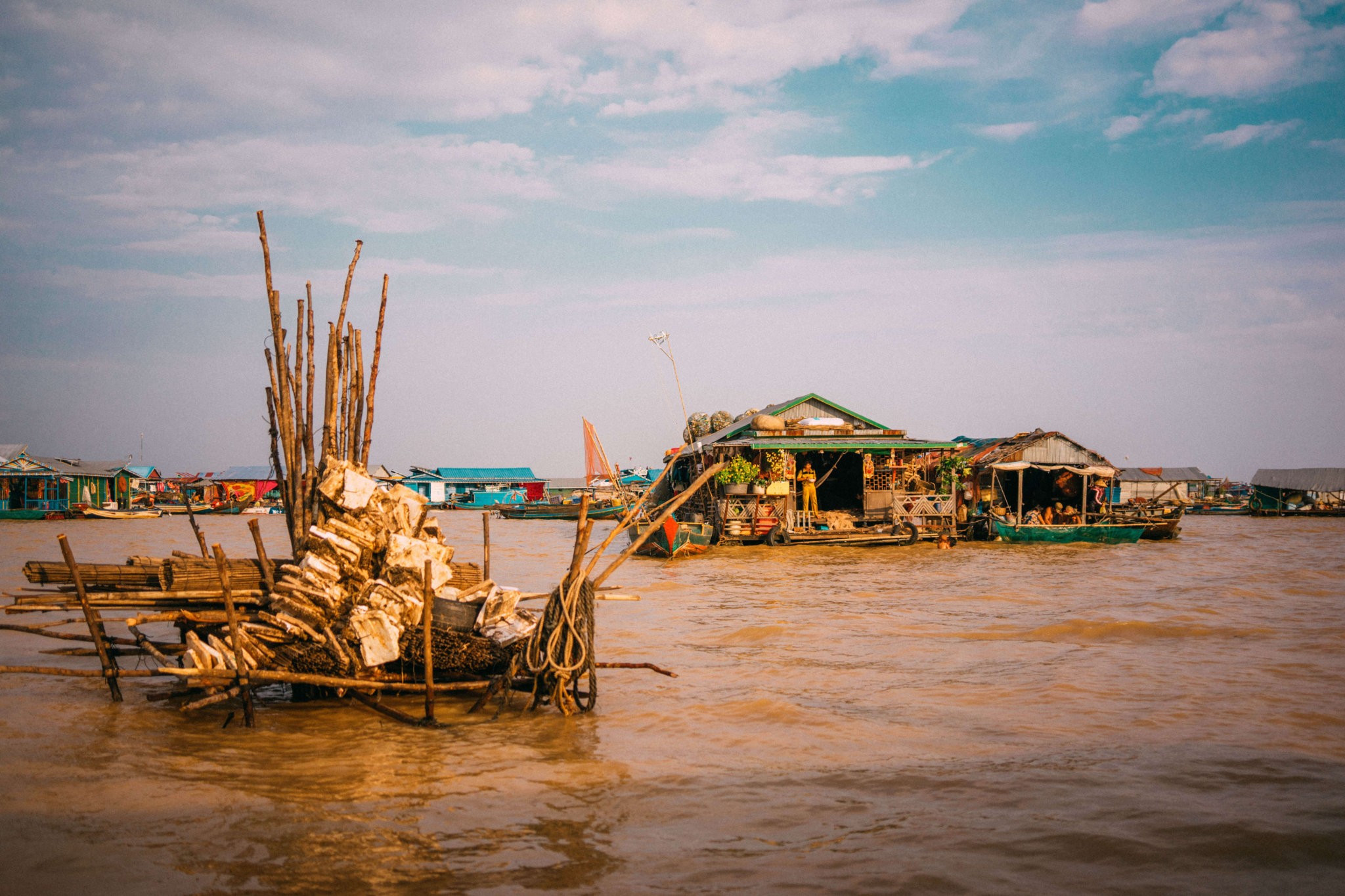 A woman was once asked to buy a bag of rice for the children in the village for , but it may have been a scam
A woman was once asked to buy a bag of rice for the children in the village for , but it may have been a scam
31. Can Visitors Still See or Learn About the Life of Former Floating Village Residents?
Yes, visitors can still see remnants of and learn about the lives of former floating village residents, but it requires a responsible and informed approach. By choosing ethical tour operators, respecting local customs, and supporting sustainable initiatives, you can contribute to the preservation of their cultural heritage and ensure that these unique communities continue to thrive. SIXT.VN is committed to providing travel experiences that are both enriching and responsible, allowing you to explore the beauty and culture of Vietnam while making a positive impact on the communities you visit.
FAQ: Visiting Floating Villages
Here are some frequently asked questions about visiting floating villages:
- Are floating villages safe to visit? Yes, most floating villages are safe to visit, but it’s important to be aware of your surroundings and take precautions against petty theft.
- What is the best time of year to visit a floating village? The best time to visit depends on the location, but generally, the dry season offers the most pleasant weather conditions.
- Do I need a visa to visit a floating village? Visa requirements vary depending on your nationality and the country you’re visiting. Check with the embassy or consulate for the latest information.
- What should I wear when visiting a floating village? Dress modestly and respectfully, covering your shoulders and knees.
- Can I bring gifts for the children in a floating village? It’s best to avoid giving individual gifts to children, as this can create dependency. Instead, consider donating to a local school or community organization.
- How can I avoid getting scammed in a floating village? Be wary of high-pressure sales tactics and overpriced souvenirs. Research tour operators and businesses thoroughly before booking.
- Are there ATMs in floating villages? ATMs are unlikely to be available in floating villages, so bring enough cash for your visit.
- Can I drink the water in a floating village? It’s not safe to drink the water in most floating villages. Stick to bottled water or purified water.
- Are there medical facilities in floating villages? Medical facilities may be limited or unavailable in floating villages. Bring a basic first-aid kit and consult your doctor about necessary vaccinations and medications.
- How can I learn more about the culture and history of floating villages? Read books, watch documentaries, and visit cultural centers to learn more about the culture and history of floating villages.
Ready to embark on an unforgettable journey to Vietnam? Let SIXT.VN be your trusted partner in creating a personalized itinerary that caters to your interests and preferences. From hassle-free airport transfers and hotel booking assistance to curated tours and 24/7 customer support, we ensure a seamless and enriching travel experience. Contact us today and discover the beauty of Vietnam with SIXT.VN!
Address: 260 Cau Giay, Hanoi, Vietnam
Hotline/Whatsapp: +84 986 244 358
Website: SIXT.VN
Don’t miss the opportunity to explore Vietnam’s enchanting floating villages and immerse yourself in its vibrant culture. Book your trip with SIXT.VN and create memories that will last a lifetime.



